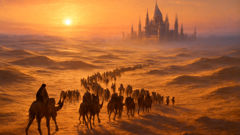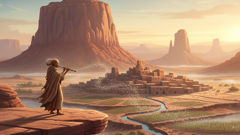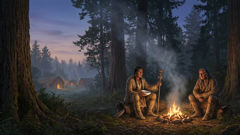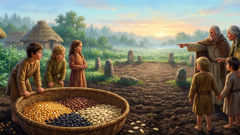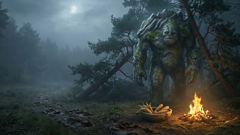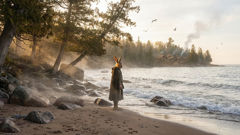Introduction
Beyond the winding alleys of old Baghdad, where the scent of cardamom drifts through bustling bazaars, stretches an ocean of sand and legend—the Syrian Desert. To the west, beneath an endless sky, tales drift with the wind, whispered at fire-lit gatherings or scrawled into memory by wandering poets. Among these, none is so alluring or mysterious as the story of the City of Brass. For centuries, it was spoken of in hushed voices: a city forged by ancient hands, its gates cast in gleaming metal, its streets lined with secrets, its towers haunted by jinn. It was a city no map could capture and few dared to pursue—a place where wisdom and danger shimmered like heat on the horizon. In an age when the Abbasid caliphs sent their scholars and explorers beyond the known, curiosity burned as fiercely as the midday sun. It was in this golden era that a group of determined travelers—scholars, soldiers, poets, and magicians—set out from Baghdad, driven by the hope of finding the lost city. Their leader, the renowned historian Musa ibn Khalid, had pieced together fragments from forgotten scrolls and carved inscriptions: hints of a civilization erased by time but not by memory. As their caravan wound through date-palm oases and over sun-bleached dunes, the travelers carried more than water and provisions. They bore questions: Could wisdom survive where men had vanished? What secrets slept beneath brass and sand? And most troubling, could even the cleverest among them control a power older than history itself—the jinn said to be imprisoned within a bottle of burnished brass? The journey ahead would test not only their endurance but their trust in one another and in the lessons buried beneath stone and legend. In the shifting desert, every footstep left more than a mark in the sand; it echoed a longing for discovery, for understanding, and perhaps, for redemption.
I. The Caravan Sets Forth
The day the expedition departed from Baghdad, the city hummed with expectation. Merchants and beggars, scholars and storytellers—everyone had an opinion about the City of Brass, though most would never cross the first line of dunes. Musa ibn Khalid led the way, his turban wound tightly against the wind, his eyes fixed on the west. With him traveled Qamar, a poet with a voice soft as dusk; Farid, a grizzled soldier who had seen too much; Layla, a young magician whose knowledge far exceeded her years; and several porters, guides, and servants. Each bore their own reasons for joining the quest, from gold to glory to the desperate hope that ancient wisdom might heal a broken world.
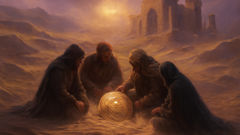
Their first nights beyond the Euphrates were filled with stories, laughter, and the scent of roasting lamb. Yet as the sand grew deeper and the stars seemed closer, their talk turned to the tales of jinn and forgotten kings. Musa read aloud from a crumbling parchment, its script faded but urgent: “He who seeks the City of Brass must be prepared to pay a price—whether in knowledge, in sorrow, or in the currency of his soul.” Qamar sang old verses about vanished empires and cities swallowed by time. Layla gathered herbs at dusk and traced protective sigils in the sand.
Days passed in shimmering heat. The caravan crossed salt flats that flashed like mirrors and wandered through valleys where nothing moved but the wind. On the seventh day, a fierce sandstorm struck. Visibility vanished. Camels bellowed and men cursed as the world narrowed to a swirl of orange and gold. In the chaos, Layla’s voice cut through: “This is no ordinary storm.” She knelt and listened to the wind, then called for everyone to gather. With a gesture and a whispered incantation, she shaped a circle of safety, sheltering the group until the fury passed.
When calm returned, they found themselves in a landscape transformed. The dunes now curved in patterns unlike any they’d seen, as if shaped by an ancient hand. Atop one ridge, Farid spotted something that caught the sun: a sliver of brass protruding from the sand. The group hurried to investigate, digging with bare hands until they uncovered a piece of intricately worked metal, engraved with a script none could read but Layla. “This is a warning,” she translated. “Turn back or awaken what sleeps.”
Yet Musa pressed forward. He believed that wisdom awaited those who dared. The caravan moved on, passing petrified trees and ruined watchtowers. At an abandoned well, they found a skeleton clad in armor, clutching a silver coin. Qamar composed a verse for the forgotten man, and Layla placed a sprig of sage at his feet. Even Farid grew somber, murmuring a prayer for safe passage. Nights grew colder, and the group grew quieter, their dreams troubled by visions of brass gates and burning eyes. Each step felt heavier, as if the desert itself weighed their intentions.
II. The Gates of Brass
By the fourteenth sunrise, their provisions ran low. The landscape grew harsher, with fields of cracked earth and valleys haunted by mirages. Still, Musa’s resolve did not falter. He led the group by the stars, consulting old maps and celestial charts. At dusk one evening, as the sky bled purple, Layla called out softly. Before them, emerging from the rippling haze, stood the City of Brass.
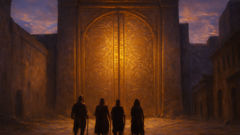
Its walls rose from the desert like the bones of a giant beast, towers capped with domes that glowed even in shadow. The gates were immense, cast from a single piece of metal and engraved with images of serpents, lions, and strange winged creatures. The city was silent, but not dead. The air shimmered with unseen energy; every stone whispered of secrets.
They approached with caution, hearts hammering in their chests. Farid examined the gate for traps while Layla traced her fingers over the inscriptions. “To enter,” she murmured, “one must answer a riddle: What is the treasure no thief can steal, but every soul can lose?” Qamar smiled sadly. “Wisdom,” he whispered. The gates groaned open.
Inside, the streets were lined with statues—men and women frozen in poses of terror or awe. Some clutched jewels; others shielded their eyes. At the city’s heart stood a palace of impossible beauty, its facade covered in plates of polished brass. At its doors, a brass automaton—half-man, half-beast—stood sentinel. Layla addressed it in the old tongue. The automaton bowed and stepped aside, granting them passage.
Within the palace, rooms glittered with gold and precious stones, but all felt cold and empty. In a grand hall, they discovered a mural telling the city’s story: once ruled by Queen Samirah, a wise but prideful sovereign who sought to bind the jinn for her own ends. She forged a bottle from enchanted brass and trapped a powerful jinn named Amash inside. But her arrogance brought ruin. The city fell to a curse; its people turned to metal, its ruler vanished. Only the jinn remained, sealed and waiting.
In a chamber beneath the throne, the travelers found the fabled brass bottle, locked with arcane seals. Qamar trembled as he touched it; Farid drew his sword. Layla whispered words of caution. Musa hesitated, torn between the promise of wisdom and the fear of unleashing disaster. “Knowledge is no treasure if it destroys those who seek it,” Layla warned.
As the group debated, a faint voice echoed from within the bottle—pleading, promising freedom in exchange for answers to three riddles. The travelers gathered close, breathless. The first riddle was posed: “What is born from silence yet never speaks, grows with time yet never breathes?” The answer came to Qamar in a flash: “Memory.” The jinn’s laughter rang out, approving. The second riddle followed: “What can cross the world without leaving a mark, yet is felt by every heart?” Layla answered: “Hope.”
The final riddle was hardest: “What is sought by all but claimed by few, more precious than gold or glory?” Musa spoke, his voice steady: “Wisdom.” The bottle glowed, the seals dissolving in a dance of light.
III. The Jinn’s Bargain
Light spilled from the bottle, growing until it filled the chamber with radiance. From within emerged Amash, the jinn: tall as a palm tree, wreathed in smoke and with eyes like coals. His presence pressed on every soul in the room, yet he did not lash out. Instead, he gazed at each traveler in turn—seeing into their hearts, weighing their intentions.
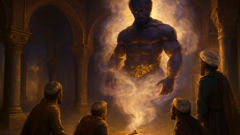
Amash’s voice rolled like distant thunder. “You have answered wisely and well. Yet my freedom is not without cost.” He told them the history of Queen Samirah’s hubris—how she sought to bind not only the jinn but fate itself, and how her ambition doomed her people. “The city’s curse,” Amash intoned, “can be lifted only by those who place wisdom above greed, mercy above vengeance.”
He offered the travelers a choice: take from the city what treasures they wished, and leave forever cursed with longing and regret; or renounce all claim to its riches, seeking only understanding, and restore the city’s memory to the world.
The group was silent for a long while. Farid eyed a jeweled sword, hands itching to possess it. Qamar lingered over golden scrolls containing forgotten poems. Layla’s gaze lingered on a book of magic so potent it could change the course of history. But Musa stepped forward first. “We came seeking wisdom,” he said quietly. “Let that be enough.” One by one, the others followed his lead, each letting go of desire and embracing humility.
Amash bowed his head. With a gesture, he released a surge of wind that swept through the palace and out into the city. Statues shuddered, metal flaked away, and echoes of laughter and song filled the air. For a moment, the city flickered with life—a vision of what once was and might be again.
As dawn broke over the desert, Amash faded into mist, his laughter softer now. “May you remember what you have learned,” he whispered, “and share it beyond these sands.” The city’s gates swung open once more, beckoning the travelers home.
Their return to Baghdad was quiet. They bore no treasures, no trophies—only tales and lessons. Musa documented their journey in a new scroll. Layla taught the wisdom she’d gained to her students. Qamar composed verses that would echo through generations. Farid, changed by humility, became a protector rather than a conqueror. And though none would ever find the City of Brass again, its memory lingered—etched in story, in song, and in the hearts of those who believed that wisdom was the greatest treasure of all.
Conclusion
The desert eventually covered the city’s gates once more, erasing footprints and hiding the brass towers beneath a shroud of shifting sands. In Baghdad and beyond, the tale of the City of Brass spread—sometimes as a warning, sometimes as a promise. It reminded all who heard it that curiosity could illuminate or destroy, that greed could turn gold to dust, and that wisdom, once earned, must be cherished above all else. For Musa and his companions, the journey was more than a search for lost wonders; it was a trial of character and spirit. Each learned that true treasure lay not in what could be hoarded or displayed, but in the humility to let go, to listen, and to understand. Long after their bones joined the desert’s secrets, their story endured—carried by winds, written in verses, and retold whenever the sun set red over the dunes. And somewhere, far beyond the reach of maps, the City of Brass gleamed on in legend: a beacon for those who seek not riches, but meaning.

